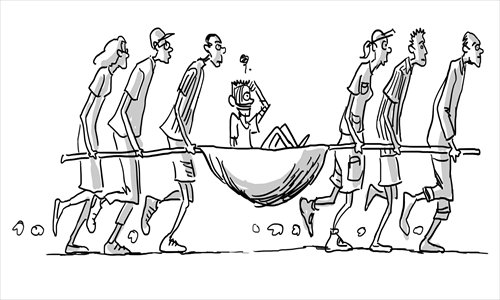Rescuers go astray in well-meaning quake efforts

"Much distress regenerates a nation," wrote former Chinese premier Wen Jiabao, quoting an ancient classic, on a makeshift middle school blackboard when he visited the hardest-hit prefecture in the 2008 Sichuan massive earthquake.
Five years later, his morale boosting and soothing words were still being cited in the wake of a 7.0-magnitude quake that jolted Ya'an, a county in Sichuan Province on April 20.
Yet the next line of the source text, largely ignored, seems more thought-provoking: "Deep misery illuminates wisdom," implying that calamities may enlighten and edify the soul of the general public.
The barrage of natural disasters did kindle the volunteerism of Chinese, triggering a blanket grass-roots involvement. Donations to Ya'an poured in at full tilt, alongside civic-minded volunteers and NGOs in the rescue and relief efforts.
However, unprepared, untrained and unprofessional volunteers sometimes piled on the agony in a region already dogged with mishaps.
The outpouring of volunteers and civil groups added stress to the tight aid supply. For instance, 18 people had to huddle for warmth in a tent designed for six.
The passion of volunteers "could not translate into the necessities they would need to survive in a quake-stricken circumstance," said Wang Hao who led voluntary work to a foreign media.
Large fleets also hampered the relief operations. Shortly after the seismic event, vehicles far and wide, both government dispatched and driven by individual volunteers, clogged the only two roads leading to the epicenter.
Worse still, "squeezing on the narrow paths of Sichuan is tougher than climbing up to heaven," a poet of yore once wrote. Winding mountainous roads are as yet impassable. Some volunteers with questionable driving skills may meet with landslides or even end up in need of rescue themselves.
On the day the temblor struck, a military truck carrying 17 soldiers on a rescue mission fell off the cliff into a river while trying to avoid hitting a private car. Two soldiers lost their lives.
The Sichuan Public Security Department later announced a ban on nongovernmental vehicles in order to "allow more time for saving lives."
Such chaos may be why members of a 20-person impromptu volunteer team spent a whole day trekking to the afflicted district, loaded with 15 boxes of biscuits and two packets of medicine, only to find the army has earlier sent relief goods and aid workers there.
"We have volunteers tiring themselves out for things quake victims don't urgently need. We should rethink, not celebrate," sighed Chen Xiao who headed the team.
His frustration is partly shared by Han Han, a popular opinion leader, who admitted in his latest blog article, "My friends and I arrived at the stricken zone in 2008 but ended up being not so helpful."
Righteous ardor alone is not enough for good Samaritans to pull off the humanitarian jobs that call for technical expertise and hands-on experience, like CPR, artificial respiration, PTSD counseling and self-protection in ensuing aftershocks.
Rescuers being reduced to rescuees is a sobering scenario. More room should therefore be left for professional organizations with rescuing, medical, sanitary and physiological personnel.
But volunteerism had its place, especially in keeping a critical eye on media coverage. An official microblog of a domestic satellite TV stated that "villagers of Zhongba (one of the hit areas) feasted in a festive mood after the earthquake," hinting they squandered on the donated food.
Incised people rallied to tell another journalist that the fish and meat were actually handed out by a villager who happened to hold a banquet earlier that day.
Conscious citizens opted not to obscure the relief activities and instead, offered helping hands at home. They donated money and substance, or reposted information of finding missing people online, especially with the meteoric rise of Sina Weibo, China's Twitter-like service, where media staff issued prompt, down-to-earth reports unlike once straitlaced newspeak or tear-jerker sidelights.
After all, to quote another ancient saying, "empty talk harms the nation, practical action helps it thrive."
The author is a Shanghai-based freelance writer. opinion@globaltimes.com.cn
Volunteers’ work brought hope to stricken regions